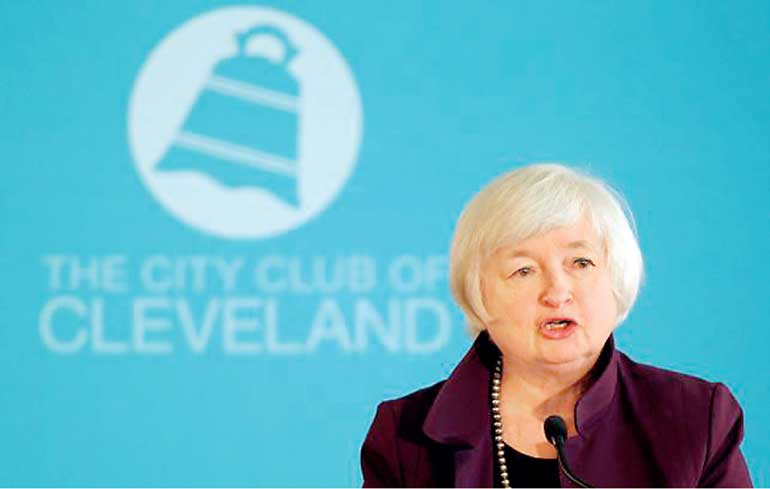Saturday Feb 21, 2026
Saturday Feb 21, 2026
Monday, 13 July 2015 00:00 - - {{hitsCtrl.values.hits}}
 U.S. Federal Reserve Chair Janet Yellen speaks at The City Club of Cleveland in Cleveland, Ohio
U.S. Federal Reserve Chair Janet Yellen speaks at The City Club of Cleveland in Cleveland, Ohio
Federal Reserve chair Janet Yellen on Friday said she expects the Fed to raise interest rates at some point this year, but pointed strongly to her concerns that US labour markets remain weak and that more workers could be encouraged back into the job market with stronger growth.
In her speech Yellen gave no direct hint about whether she anticipates more than one rate hike over the Fed’s four remaining meetings of 2015. But her focus on domestic economic developments looked beyond recent market turbulence over Greece and China, and keeps the Fed’s plans on track.
She said she expects the economy should grow steadily for the remainder of the year, allowing the Fed to move ahead with its first rate hike in nearly a decade.
“I expect it will be appropriate at some point later this year to take the first step to raise the federal funds rate and thus begin normalising monetary policy,” Yellen said in a speech to the City Club of Cleveland, a civic group that sponsors high-level speakers.
“But I want to emphasise that the course of the economy and inflation remains highly uncertain...We will be watching carefully to see if there is continued improvement in labour market conditions, and we will need to be reasonably confident that inflation will move back to 2% in the next few years.”
US Treasury yields rose and the dollar rallied against a basket of currencies after Yellen’s remarks, while stocks modestly pared gains.
Despite the improvement of recent years, she said labour markets remain out of line, with high levels of part-time work and weak participation rates.
The low unemployment rate “does not fully capture the extent of slack,” she said. “I think a significant number of individuals still are not seeking work because they perceive a lack of good job opportunities and that a stronger economy would draw some of them back into the labour force.”
Analysts saw Yellen’s comments deviating little from the central bank’s recent policy statement. Though global markets have been turbulent in recent weeks since the Fed’s June meeting, Yellen focussed on US growth she feels is likely to continue and will push the economy closer to the Fed’s full-employment and 2% inflation goals.
“If the economy continues to improve, the Fed will raise rates this year. It clearly wants to,” said Jim McDonald, chief investment strategist at Chicago-based Northern Trust Asset Management.
Yellen’s remarks come less than a week before she is to appear before Congress for a biannual briefing on monetary policy, and as the central bank approaches a likely rate hike decision.
It is a step that will have global implications, putting the Fed on a path separate from central banks in Europe and Japan that continue fighting economic crises, and potentially drawing capital out of developing economies.
According to the individual economic projections released by Fed officials at their June meeting, there was a roughly even divide between those who expect only one interest rate increase this year – and might thus be prepared to wait until late in the year to hike – and those who expect two and would want to move sooner.
Yellen’s position on that point remains uncertain, though her influence as chair is likely pivotal in the ultimate decision.
Fed officials seem to have set the stage for an initial increase as early as September. But recent events – the stock market collapse in China and the confusion in Greece in particular – have raised fresh concerns over how the world economy may hurt US growth. Investors now believe an initial hike is not likely until next year.
The Fed has kept rates near zero for almost seven years.
Though it will likely take years for the central bank to gradually return rates to more normal levels, the initial step – ‘liftoff’ – has attracted outsized attention as a symbol that the Fed is ready to declare the crisis over.
Yellen said she felt that initial step will have a small impact, and that the Fed would be raising rates only gradually from that point on.
Yellen said she agreed that a slow start to the year was likely the result of temporary factors, such as low oil prices undercutting investment in the US energy sector, and a rising dollar pushing up the international price for US exports.
But she also said the economy faced constraints that could hold it back, from a still underperforming housing market to the unresolved crisis in Greece.